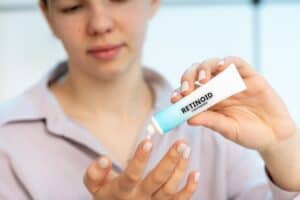Medically reviewed by Sophia Yen, MD, MPH
If you’re searching for ‘does vitamin C help acne?’ you want a straight answer. Vitamin C’s antioxidant properties suggest a potential benefit for acne by reducing inflammation and aiding in skin repair. This article will explore the existing evidence on vitamin C’s effects on blemishes and scars, provide practical advice on integrating it into your skincare routine, and suggest dietary tips for maintaining skin health.
Exploring the Role of Vitamin C in Acne Management

Vitamin C, also known as ascorbic acid, is more than just a potent antioxidant. It’s an essential player in skin health, helping to neutralize harmful free radicals and prevent skin damage. But its role doesn’t stop there. When applied topically, vitamin C may decrease acne-related inflammation, leading to less redness and swelling of the skin. As a result, those pesky acne breakouts may appear less severe.
Various topical products for acne treatment in the field of cosmetic dermatology now incorporate vitamin C due to its ability to improve the appearance of acne wounds through anti-inflammatory action. Curious about how this works? Let’s explore the science connecting vitamin C and acne.
The Science Behind Vitamin C and Acne
The beauty of vitamin C lies in its anti-inflammatory properties. When applied topically, it can reduce the redness and swelling associated with acne, giving your skin a smoother, more even appearance.
Vitamin C’s role extends beyond reducing inflammation, it is also effective in diminishing the appearance of acne scars. Thanks to its anti-inflammatory action, areas of hyperpigmentation can diminish, improving the look of acne scars. So, if you’ve been battling with cystic acne or worrying about acne scars, a topical vitamin C product might be helpful.
It’s worth mentioning that before making a dash to the store, keep in mind that research on the relationship between vitamin C serum and acne has yet to reach a definitive conclusion. There is no definitive study showing that Vitamin C serum can help reduce acne. So, while vitamin C shows promise, it’s best to proceed with the facts or the knowledge that we don’t know.
TLDR: Topical Vitamin C is good for decreasing redness and hyperpigmentation. It is not sufficient to treat or prevent acne. It can cause irritation when combined with retinoids. It can inactivate retinoids. Not all preparations of vitamin C are biologically active, it may not be strong enough, others do not chemically convert to the biological active form in the skin.
Navigating the Benefits of Vitamin C for Acne Scars
Acne scars can be a constant reminder of past breakouts, making it hard to move on and appreciate your skin. But what if there was a way to improve their appearance? Enter vitamin C.
Vitamin C is known for its role in collagen biosynthesis, which directly influences collagen production. Acting as a cofactor for the enzymes required to stabilize and cross-link collagen molecules, it directly influences the amount and quality of skin collagen. This means that vitamin C can promote collagen synthesis, improving the appearance of atrophic acne scars, and even have a regulatory effect on collagen in hypertrophic or keloid scars.
Aside from promoting collagen synthesis, vitamin C also helps reduce melanin production. By inhibiting the activity of the tyrosinase enzyme, it contributes to an even skin tone and reduces the appearance of dark spots. So, with regular application of topical vitamin C, you may not only see a reduction in acne scars but also an improvement in hyperpigmentation.
Vitamin C and Skin Regeneration: Healing Beyond Acne
Vitamin C’s benefits are not limited to acne management. It’s a vital player in skin regeneration, aiding collagen synthesis, immune cell function, and supporting angiogenesis, all crucial for skin healing and new tissue formation. So, whether you’re dealing with an acne breakout or a minor skin wound, vitamin C is there to promote wound healing (oral not topical!) and restore your skin’s health.
As a potent antioxidant, vitamin C also serves as your skin’s personal bodyguard, protecting it from harmful UV light. By neutralizing free radicals generated by UV light, vitamin C can reduce inflammation and prevent cellular damage, including to collagen. So, applying vitamin C after UV exposure maximizes photoprotective effects.
The benefits of vitamin C aren’t limited to topical use. A proper dietary intake of vitamin C is crucial for effective skin regeneration, However, make sure you avoid excessive supplementation otherwise you might get side effects like gastrointestinal disturbances and kidney stones. So, remember to load up on your citrus fruits and leafy greens to ensure your skin gets the vitamin C it needs.
The Interplay Between Vitamin C and Retinoids
Combining vitamin C with other acne treatments, such as retinoids, might seem like a good idea. After all, more is often better, right? Well, not always. When it comes to skincare, the rule is a bit different. Sometimes, more might lead to skin irritation and your retinoids not working.
This is particularly true when incorporating vitamin C with treatments like retinoids. While both have their benefits, using them together can be too potent and may cause skin irritation. Also the vitamin c may inactivate the retinoid, wasting your time and money. Hence, it’s necessary to adhere to certain guidelines to avert irritation and reap maximum benefits.
Remember, before adding vitamin C skin care products to a routine that includes prescription topical or oral acne medications, consulting a doctor is recommended. Because when it comes to skincare, it’s not just about what you use, but what you use it with and the possible positive or negative interactions.
Vitamin C in the Morning, Retinoids at Night
If your skincare routine involves both vitamin C and retinoids (like retin A, tretinoin, adapalene), the timing of their application is critical. When the two are used at the same time, they can be irritating. To avoid skin irritation, it’s best to apply vitamin C in the morning and retinoids at night. This way, your skin gets to enjoy the benefits of both without the risk of irritation. When the two are used at the same time, the vitamin C can inactivate the retinoid meaning making your prescription retinoid not work.
Morning application of vitamin C enables your skin to fight free radicals and regulate oil production all day. It’s like giving your skin a protective shield to start the day. Then, at night, your skin can benefit from the effects of retinoids, without the interference of vitamin C.
While this regimen could prove beneficial, it’s essential to keep an eye out for any signs of irritation or adverse reactions. If you notice any discomfort, adjustments should be made to the skincare routine as needed. Remember, your skin is unique, and what works for others might not necessarily work for you.
Minor Adverse Reactions and How to Handle Them
Despite the multitude of benefits vitamin C offers, it does have potential downsides. Minor adverse reactions associated with topical vitamin C include:
- Yellowish discoloration of the skin
- Hypopigmented hair
- Staining of clothes
- Stinging
- Redness
- Dryness
Sounds a bit scary, right? But don’t worry, there are ways to make these effects less likely.
To minimize the risk of irritation, it’s recommended to use vitamin C serums that contain no more than a 20% concentration and have a pH lower than 3.5. If you have sensitive skin, you might benefit from starting with lower concentrations and gradually increasing. It’s all about finding the right balance for your skin.
Should you encounter redness, irritation, or discomfort, stop the medication/cream and get help from your doctor for substitute treatments or necessary changes to your routine. Also, consider using a moisturizer to alleviate any dryness or redness, and avoid applying the serum around the sensitive eye area to prevent potential irritation.
Professional Prescription Acne Treatment Alternatives
While vitamin C is a promising solution for skin health, there is no evidence that it treats acne. Luckily there are other options available. Pandia Health, provides online consultations with board-certified physicians that can prescribe effective acne treatments to anyone that needs it. Vitamin C probably isn’t doing the trick for your acne, but don’t lose hope.
With Pandia Health, you can receive personalized treatment plans with progress tracking, home medication delivery with free goodies, and the convenience of automatic prescription refills. Who said treating acne couldn’t come with a side of fun?
A comprehensive range of acne vulgaris treatments is available, including:
- Prescription topical retinoids
- Antibiotics
- Retinoid Creams or Gels
- Hormonal methods (birth control pill, anti-hormonal spironolactone)
- Isotretinoin for severe cases (not available via Pandia Health. You need to see a dermatologist for this very strong medication.)
So whether you’re dealing with mild acne or battling severe breakouts, there’s a treatment option for you. If you’re ready to say bye to your acne and hello to clear skin, get started today with an online consultation to get what your skin needs.
Takeaway
Navigating the world of acne management can be overwhelming. With so many treatment options available, finding the right one for your skin can feel like searching for a needle in a haystack. But amidst this complexity, vitamin C can help with hyperpigmentation.
Whether it’s reducing acne-related inflammation, improving the appearance of acne scars, or supporting skin regeneration, vitamin C is aplayer in skincare. While more research is needed, the existing evidence presents a promising picture. So, know that you can give vitamin C a spot in your skincare routine and see the magic unfold?



